Words MAXMILIAN WECHSLER
Portrait photographs Jaran Lakkanawat
Portrait photographs Jaran Lakkanawat
| VISITORS to European Union embassy on Wireless Road are treated on arrival to the colourful spectacle of the flags of all 28 EU member states and that of the EU itself. It’s a poignant reminder of the responsibilities shouldered by the Spanish-born Head of Delegation of the EU to Thailand, His Excellency Jesus Migúel Sanz. Despite his relative youth, before coming to Bangkok Mr Sanz had already held a number of important diplomatic positions at Spanish embassies around the world. Not altogether surprisingly, his language skills are considerable. |
“I can speak English, French, some German, Italian, Mandarin, Portuguese and, of course, Spanish, which is a very important language in the world. I am now learning Thai, with the help of a young, patient and talented teacher.”
Mr Sanz was born and raised in Madrid, the capital of Spain. After studying agronomics engineering at Polytechnic University in Madrid, he became a mathematics teacher at this prestigious university, teaching algebra to university students.
His next career move went in a completely different direction – he joined the diplomatic service. “I started my career in Africa, in Tanzania. I was also at the time the Spanish consul for the Indian Ocean. From there I went to Paris, then to China, and for a time was posted back in Madrid. Afterward I was appointed as Spanish ambassador to New Zealand and Pacific countries such as Tonga, Samoa, Fiji, Kiribati and the Cook Islands.
My next move was joining the EU diplomatic service.
“I took up my post as EU ambassador to Thailand and Laos in September 2013. This is my professional diplomatic career in brief. Along the way I became a lawyer as well,” said Mr Sanz.
“I have been lucky to serve in very interesting countries. My first trip to Africa as a young diplomat was wonderful, visiting places like Madagascar, Kenya and Zanzibar. I had the chance to get in contact with the reality of the developing world. Then, Paris is very comfortable and near my home town. France is a very interesting country. I enjoyed living there, of course.
“Beautiful China with its ancient civilization and powerful culture – it’s not an emerging country but an ‘emerged’ country. It is a big power and it is important for diplomats to understand China if they want to know what’s going on in the world. Next was New Zealand, which is actually a jewel in the Pacific. Honestly, I have liked all my postings. I don’t have a preference.
“And now I am in Thailand, a country I love. My first visit here was when I was very young in the ’80s. I was a university student and I came with a couple of friends. We spent some time in the United States, basically New York, and from there we came to Thailand. Bangkok was a very different city then. I have many memories, even though it was so long ago.
“The city was different, but I remember that the people were very friendly, as they still are. I was in Bangkok only a couple of days and then went up-country. I can remember perfectly well Lumpini Park and I remember there were many canals in the area. There weren’t so many tall buildings, but the traffic was hectic. I actually think that now the traffic is much better. I remember that it took us hours to get to Don Muang airport. We were terrified that we would miss the plane but luckily we made it on time. Everything was very pleasant. My memories are related to kindness and friendship. I still think that Bangkok is a lovely city – cosmopolitan and charming at the same time,” Mr Sanz said.
Mr Sanz was born and raised in Madrid, the capital of Spain. After studying agronomics engineering at Polytechnic University in Madrid, he became a mathematics teacher at this prestigious university, teaching algebra to university students.
His next career move went in a completely different direction – he joined the diplomatic service. “I started my career in Africa, in Tanzania. I was also at the time the Spanish consul for the Indian Ocean. From there I went to Paris, then to China, and for a time was posted back in Madrid. Afterward I was appointed as Spanish ambassador to New Zealand and Pacific countries such as Tonga, Samoa, Fiji, Kiribati and the Cook Islands.
My next move was joining the EU diplomatic service.
“I took up my post as EU ambassador to Thailand and Laos in September 2013. This is my professional diplomatic career in brief. Along the way I became a lawyer as well,” said Mr Sanz.
“I have been lucky to serve in very interesting countries. My first trip to Africa as a young diplomat was wonderful, visiting places like Madagascar, Kenya and Zanzibar. I had the chance to get in contact with the reality of the developing world. Then, Paris is very comfortable and near my home town. France is a very interesting country. I enjoyed living there, of course.
“Beautiful China with its ancient civilization and powerful culture – it’s not an emerging country but an ‘emerged’ country. It is a big power and it is important for diplomats to understand China if they want to know what’s going on in the world. Next was New Zealand, which is actually a jewel in the Pacific. Honestly, I have liked all my postings. I don’t have a preference.
“And now I am in Thailand, a country I love. My first visit here was when I was very young in the ’80s. I was a university student and I came with a couple of friends. We spent some time in the United States, basically New York, and from there we came to Thailand. Bangkok was a very different city then. I have many memories, even though it was so long ago.
“The city was different, but I remember that the people were very friendly, as they still are. I was in Bangkok only a couple of days and then went up-country. I can remember perfectly well Lumpini Park and I remember there were many canals in the area. There weren’t so many tall buildings, but the traffic was hectic. I actually think that now the traffic is much better. I remember that it took us hours to get to Don Muang airport. We were terrified that we would miss the plane but luckily we made it on time. Everything was very pleasant. My memories are related to kindness and friendship. I still think that Bangkok is a lovely city – cosmopolitan and charming at the same time,” Mr Sanz said.
Delegation of the EU in Bangkok and Vientiane
“The Delegation of the European Union in Bangkok was opened in 1979,” said Mr Sanz. “We have 56 people working there, 30 of them foreigners. We also have a brand new and very beautiful office in Vientiane, Laos. There are 20 staff there, including about ten foreigners. Laos is also a very nice country and I travel there as much as I can.
“The ambassadorial term in the EU diplomatic service is four years. After that I can either be an EU ambassador to another country or go back to Brussels. Or perhaps I will go back to Madrid and work at the Ministry of Foreign Affairs, or be the Spanish ambassador to another country. I haven’t yet decided what I want to do, and I still have another two years to go here.”
Being an EU ambassador is a challenging job, but it’s one Mr Sanz enjoys and believes in. “We have a long history of integration in Europe. We started many decades ago, basically after the Second World War, for obvious reasons. We understood that we have to remain together to move forward and to avoid confrontation. In the last decade we have built up the European identity and recently brought into force the very important Treaty of Lisbon.
“Basically my job is to coordinate the actions of the 28 EU countries within Thailand and to make sure they are coherent and in accordance with what is decided in Brussels by the Member States and the EU. My job is to represent the interests of Europe beyond Europe’s borders and basically try to promote European values and human rights, as well as try to defend our economic interests.”
Mr Sanz noted that EU policy, including trade and foreign investment strategies, is decided in Brussels, with the goal of promoting the European “reality.” He said his job is to carry out this work in Bangkok, which would not be possible without the support and collaboration of the 20 ambassadors from EU nations in residence here. “Otherwise it would simply be a very difficult task. They are very constructive and they all understand what is at stake. They know that the world is changing and that we have to remain together if we want to defend our interests. I would say that they make my job possible and I am really grateful to them.
“My job implies trying to understand 28 different realities. All of us are Europeans, but Europe is a very diverse continent. I think the diversity is an advantage for us. It makes us richer. The different languages, climates, customs, mentalities and points of view complement each other and are the key to our success,” Mr Sanz said.
Asked if the EU offices in Brussels keep in regular contact with all EU ambassadors in Thailand or delegate that responsibility to him, Mr Sanz replied: “I do it. There’s a group of European ambassadors in Bangkok and I chair the group.”
He said the EU and Thailand have a long relationship covering many areas, and underlined a few of them. “Maybe we should start with culture. We have a film festival with many movies from EU countries. We are extending outside of Bangkok to Chiang Mai and Khon Kaen. Admission is free. We try to attract the general public and feature the most recent and beautiful films produced by the very creative and diverse European film industry.
“We have a new application for iPhone identifying places related to European cultural heritage in Thailand. This originated as a map marked with important places in Bangkok and Ayutthaya. It was so successful that we decided to expand on the idea and we now have an application for mobile phones that pinpoints more than 250 sites of European cultural heritage all over the country. You also have access to a calendar with an agenda of European cultural activities. For example, if there’s a French festival going on or an Italian lecture somewhere, it will be listed. It also lists pubic events that are taking place at our embassy and other European embassies and cultural centers.
“I want to stress that we are always trying to work with young Thais and students. The EU has been sponsoring the largest English inter-varsity debate tournament in Thailand for the past ten years, for example. I think it is very moving to see these bright and talented Thai students who are extremely motivated to debate. I think it is important to plant the seeds for the future generation to have the ability to discuss issues freely and hopefully eventually to find a common position. It is very important to nurture a culture of debate.”
Mr Sanz then discussed the ongoing negotiations for the Thai-EU Free Trade Agreement. “Europe is one of the main investors not only in Thailand but in the region and we have already been through four rounds of negotiations for the FTA. We are currently looking at ways to re-engage. It will be very important for the region if we succeed in signing the agreement and I think that both Thailand and Europe will benefit greatly. We have a lot of interests in the region and we are a very important market for Thailand as well.”
The ambassador travels within Bangkok as much as he can. “Last year I was very busy because of the political situation, which required a lot of coordination with EU member states. I had to stay mostly in Bangkok, but I was able to travel to the North, to the border with Myanmar, to the border with Laos, Chiang Mai, Chiang Rai and also to the South, to Pattani and Yala. I must say it was very interesting. This year I plan to increase my presence outside of Bangkok.”
| At home in the Kingdom Asked about disappointments here, the ambassador answered in two short sentences: “Intolerance and violence is something that disappoints me all over the world. They are not unique to Thailand. “In general, I like Thailand very much and feel comfortable here. I like the weather, the food, the tradition, the history. I like studying the language and the people. “I like all kinds of food, but especially Asian food and definitely Thai food. I am very happy to eat in fancy restaurants or on the street. The food sold on the street is very good. I enjoy very much the soups and the noodles. I am a soup man and I also love rice and bamboo. So I am very happy in Thailand. “I don’t like the Bangkok traffic, but this is the curse of any big city around the world, and as I said before I honestly think the traffic has improved a lot. Now you have the BTS and other convenient forms of public transport. I take the BTS often. |
“Even with the traffic in Bangkok it is very easy to find a peaceful corner. Thai people have the capacity to interact in a metropolitan, very hectic world and at the same time to defend and protect their intimacy and their peace of mind through massage, meditation and by stopping for a few minutes at a temple and paying respect to Buddha …I think that this combination makes Bangkok really attractive and very pleasant. It is hectic, but not stressful. It is unique.
“Even in my city of Madrid, which is very lovely, it sometimes can be stressful. Here in Bangkok I really appreciate and value extremely this capacity of maintaining quality of life and peace of mind. Maybe it is their Buddhist background and the importance they give to compassion that makes Thais able to experience the beauty of life whatever their circumstances are.
“One of my most memorable experiences in Thailand occurred when I was first posted to China in 2005. This was just after the tsunami of December 26, 2004. I was sent here by the Spanish government to support relief efforts from our embassy in Bangkok. My job for the first months was to travel from Bangkok to Phuket and coordinate various activities.
“In the aftermath of this event everybody was extremely emotional. It was a real opportunity for me to witness the resilience, faith and strength of the Thai people. I remember during that time being in Phuket, Krabi and other areas severely hit by the tsunami. The Thai people were confronted by a very hard reality, but right away you could see the seeds of hope and get a feeling that they would recover quickly because of this capacity for resilience and a will to move on, without of course forgetting lost loved ones. It was all very hard but at the same time very positive and very constructive. I realized once again how welcoming the country was even in these terrible circumstances.”
Relaxation
“A diplomatic life means having a very full schedule, not only during office hours but also often during evening and nights. In my free time I like to read and stay home with my family. I also swim, do yoga and practice qigong and tai chi. I really enjoy playing with my son. We walk in Lumpini Park and from time to time we take a boat out on the little lake there. He is still very young and the moments I spend with him are precious, as are the moments I spend with myself, relaxing my mind.”
In conclusion Mr Sanz said: “All in all, I am very proud and feel very privileged and honored to work in this country. Honestly, I have to say that I have an excellent team and excellent cooperation from Thai officials and other European diplomats. The Thai people and the expats I come in contact with are very good to me and that makes my life very easy.”
“Even in my city of Madrid, which is very lovely, it sometimes can be stressful. Here in Bangkok I really appreciate and value extremely this capacity of maintaining quality of life and peace of mind. Maybe it is their Buddhist background and the importance they give to compassion that makes Thais able to experience the beauty of life whatever their circumstances are.
“One of my most memorable experiences in Thailand occurred when I was first posted to China in 2005. This was just after the tsunami of December 26, 2004. I was sent here by the Spanish government to support relief efforts from our embassy in Bangkok. My job for the first months was to travel from Bangkok to Phuket and coordinate various activities.
“In the aftermath of this event everybody was extremely emotional. It was a real opportunity for me to witness the resilience, faith and strength of the Thai people. I remember during that time being in Phuket, Krabi and other areas severely hit by the tsunami. The Thai people were confronted by a very hard reality, but right away you could see the seeds of hope and get a feeling that they would recover quickly because of this capacity for resilience and a will to move on, without of course forgetting lost loved ones. It was all very hard but at the same time very positive and very constructive. I realized once again how welcoming the country was even in these terrible circumstances.”
Relaxation
“A diplomatic life means having a very full schedule, not only during office hours but also often during evening and nights. In my free time I like to read and stay home with my family. I also swim, do yoga and practice qigong and tai chi. I really enjoy playing with my son. We walk in Lumpini Park and from time to time we take a boat out on the little lake there. He is still very young and the moments I spend with him are precious, as are the moments I spend with myself, relaxing my mind.”
In conclusion Mr Sanz said: “All in all, I am very proud and feel very privileged and honored to work in this country. Honestly, I have to say that I have an excellent team and excellent cooperation from Thai officials and other European diplomats. The Thai people and the expats I come in contact with are very good to me and that makes my life very easy.”
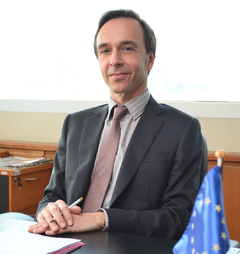
HE Mr Jesús Miguel Sanz in focus
Education
• Master in Human Rights, National University for Distance Education (UNED), Spain.
• Degree in Law from UNED, Spain.
• Degree in Agronomics Engineering, Polytechnic University, Spain.
Professional experience
• Ambassador Jesús Miguel Sanz started his assignment as Head of the Delegation of the European Union to the Kingdom of Thailand and to the Lao People’s Democratic Republic in September 2013.
• A Spanish national, he began his career in the Spanish Diplomatic Service in 1992. His most recent appointment was as Spanish Ambassador to New Zealand, the Cook Islands, Fiji, Kiribati, Samoa and Tonga from 2011 to 2013.
• During his extensive career, he has held the position of Spanish Governor to ASEF (Asia Europe Foundation) and Director General of “Casa Asia” or Asia House from 2007 to 2011.
• He was Counselor – Senior Advisor at the Office of the Minister of Foreign Affairs and Cooperation in Madrid from 2006 to 2007.
• He served from 2003 to 2006 as Political Counselor at the Spanish Embassy in Beijing and during this period he was appointed as Coordinator of Spanish Aid in the Thailand Tsunami crisis from January to April 2005.
• From 1998 to 2003 he was Counselor at the Spanish Permanent Mission to the Organization for Economic Co-operation and Development (OECD) in Paris and Permanent Representative to the Development Assistance Committee-OECD.
• He also has served at the Spanish Embassy in Tanzania as Deputy Chief of Mission with accreditation to Malawi, Comoros and Madagascar from 1993 to 1995.
EU ACTIVITIES IN THAILAND
EU birthday
Europe Day, held annually on May 9, celebrates peace and unity in Europe. The date marks the anniversary of the historical ‘Schuman Declaration’ speech in Paris in 1950, when Robert Schuman, then French foreign minister, set out his idea for a new form of political cooperation in Europe which would make war between its nations unthinkable. In Thailand, guests including diplomats, politicians, academics, media, civil society groups and young professionals are invited to celebrate the occasion with the Delegation.
European heritage and cultural calendar smartphone application
In September 2013 the Delegation of the European Union (EU), together with the Thailand cluster of the EU National Institutes for Culture, launched the European Heritage Map of Bangkok and Ayutthaya, which included 65 sites of shared European-Thai heritage. 30,000 copies of the map were disseminated around Thailand.
After the success of this project, a follow-up project in the form of a smartphone application was launched last October. The European Heritage Map and Cultural Calendar of Thailand maps, describes and illustrates some 250 sites that represent a common heritage resulting from centuries of Thai-European interactions; and it presents an up-to-date overview of cultural events organized by the EU Member States (and their institutes) in Thailand. The app aims to promote awareness and appreciation of the long and rich history of Euro-Thai relations and also promote vibrant cultural exchange in the present.
EU Film Festival
Every year, the EU Delegation hosts the European Union Film Festival in Bangkok and Chiang Mai. Its 20th anniversary was celebrated in 2011. The Festival allows visitors to experience some of Europe’s finest cinematic productions. Last year there were screenings in three provinces: Bangkok, Chiang Mai and Khon Kaen. The festival normally takes place in May and admission to all screenings is free of charge.
EU-Thailand National Intra-varsity Debate Championship
The European Union-Thailand National Intra-varsity Debate Championship was founded in 2004 as a collaboration between the European Commission in Thailand and Thammasat Speakers’ Union in order to promote greater understanding on issues related to the EU and cultivate critical thinking amongst youths in Thailand.
From a humble beginning of eighteen teams from Assumption, Chulalongkorn, Mahidol and Thammasat universities, the tournament has become the largest and most accessible debate tournament in Thailand. In 2012, a tournament was hosted by Khon Kaen University which welcomed more than 84 teams and more than 200 debaters from 24 high schools and higher education institutions across the country.
The tournament has undoubtedly provided an exceptional educational opportunity for students in Thailand to improve their critical thinking skills, English proficiency and teamwork. Developing themes such as “Debating Europe” and “Make Sense, Not War,” the tournament has brought much needed attention to current affairs issues and served to promote ideas of sustainable democratic development among Thai students. Thammasat Speakers’ Union is hosting the 10th EU Thailand National Intra-varsity Debate Championship in April 2015.
Reception for Erasmus Awardees
Every year, the Delegation hosts a reception for Erasmus awardees. Last year, the ‘Erasmus +’ scholarships enabled 58 academics from Thailand’s top universities to undertake studies and academic cooperation at some of Europe’s leading universities. These Thai scholars will start their Bachelor’s, Master’s, Doctorate and Post-Doctorate studies at European universities.
The awardees represent a wide range of academic disciplines, including business management, political science, humanities, agriculture, biology, chemistry and software engineering. The students are welcomed at universities all over the EU. Thailand started benefiting from the EU scholarship program in 2004 and there are now more than 600 Thai Erasmus Mundus (EM) alumni.
Education
• Master in Human Rights, National University for Distance Education (UNED), Spain.
• Degree in Law from UNED, Spain.
• Degree in Agronomics Engineering, Polytechnic University, Spain.
Professional experience
• Ambassador Jesús Miguel Sanz started his assignment as Head of the Delegation of the European Union to the Kingdom of Thailand and to the Lao People’s Democratic Republic in September 2013.
• A Spanish national, he began his career in the Spanish Diplomatic Service in 1992. His most recent appointment was as Spanish Ambassador to New Zealand, the Cook Islands, Fiji, Kiribati, Samoa and Tonga from 2011 to 2013.
• During his extensive career, he has held the position of Spanish Governor to ASEF (Asia Europe Foundation) and Director General of “Casa Asia” or Asia House from 2007 to 2011.
• He was Counselor – Senior Advisor at the Office of the Minister of Foreign Affairs and Cooperation in Madrid from 2006 to 2007.
• He served from 2003 to 2006 as Political Counselor at the Spanish Embassy in Beijing and during this period he was appointed as Coordinator of Spanish Aid in the Thailand Tsunami crisis from January to April 2005.
• From 1998 to 2003 he was Counselor at the Spanish Permanent Mission to the Organization for Economic Co-operation and Development (OECD) in Paris and Permanent Representative to the Development Assistance Committee-OECD.
• He also has served at the Spanish Embassy in Tanzania as Deputy Chief of Mission with accreditation to Malawi, Comoros and Madagascar from 1993 to 1995.
EU ACTIVITIES IN THAILAND
EU birthday
Europe Day, held annually on May 9, celebrates peace and unity in Europe. The date marks the anniversary of the historical ‘Schuman Declaration’ speech in Paris in 1950, when Robert Schuman, then French foreign minister, set out his idea for a new form of political cooperation in Europe which would make war between its nations unthinkable. In Thailand, guests including diplomats, politicians, academics, media, civil society groups and young professionals are invited to celebrate the occasion with the Delegation.
European heritage and cultural calendar smartphone application
In September 2013 the Delegation of the European Union (EU), together with the Thailand cluster of the EU National Institutes for Culture, launched the European Heritage Map of Bangkok and Ayutthaya, which included 65 sites of shared European-Thai heritage. 30,000 copies of the map were disseminated around Thailand.
After the success of this project, a follow-up project in the form of a smartphone application was launched last October. The European Heritage Map and Cultural Calendar of Thailand maps, describes and illustrates some 250 sites that represent a common heritage resulting from centuries of Thai-European interactions; and it presents an up-to-date overview of cultural events organized by the EU Member States (and their institutes) in Thailand. The app aims to promote awareness and appreciation of the long and rich history of Euro-Thai relations and also promote vibrant cultural exchange in the present.
EU Film Festival
Every year, the EU Delegation hosts the European Union Film Festival in Bangkok and Chiang Mai. Its 20th anniversary was celebrated in 2011. The Festival allows visitors to experience some of Europe’s finest cinematic productions. Last year there were screenings in three provinces: Bangkok, Chiang Mai and Khon Kaen. The festival normally takes place in May and admission to all screenings is free of charge.
EU-Thailand National Intra-varsity Debate Championship
The European Union-Thailand National Intra-varsity Debate Championship was founded in 2004 as a collaboration between the European Commission in Thailand and Thammasat Speakers’ Union in order to promote greater understanding on issues related to the EU and cultivate critical thinking amongst youths in Thailand.
From a humble beginning of eighteen teams from Assumption, Chulalongkorn, Mahidol and Thammasat universities, the tournament has become the largest and most accessible debate tournament in Thailand. In 2012, a tournament was hosted by Khon Kaen University which welcomed more than 84 teams and more than 200 debaters from 24 high schools and higher education institutions across the country.
The tournament has undoubtedly provided an exceptional educational opportunity for students in Thailand to improve their critical thinking skills, English proficiency and teamwork. Developing themes such as “Debating Europe” and “Make Sense, Not War,” the tournament has brought much needed attention to current affairs issues and served to promote ideas of sustainable democratic development among Thai students. Thammasat Speakers’ Union is hosting the 10th EU Thailand National Intra-varsity Debate Championship in April 2015.
Reception for Erasmus Awardees
Every year, the Delegation hosts a reception for Erasmus awardees. Last year, the ‘Erasmus +’ scholarships enabled 58 academics from Thailand’s top universities to undertake studies and academic cooperation at some of Europe’s leading universities. These Thai scholars will start their Bachelor’s, Master’s, Doctorate and Post-Doctorate studies at European universities.
The awardees represent a wide range of academic disciplines, including business management, political science, humanities, agriculture, biology, chemistry and software engineering. The students are welcomed at universities all over the EU. Thailand started benefiting from the EU scholarship program in 2004 and there are now more than 600 Thai Erasmus Mundus (EM) alumni.

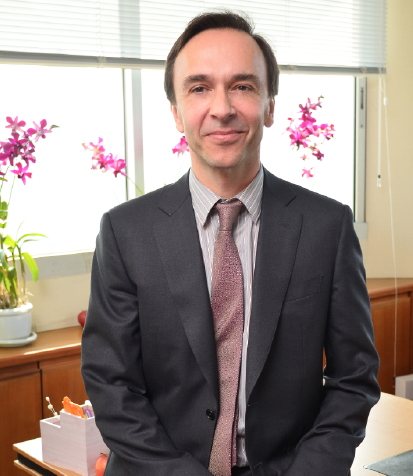
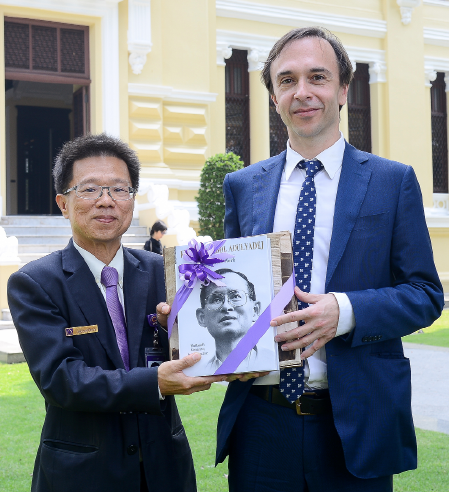
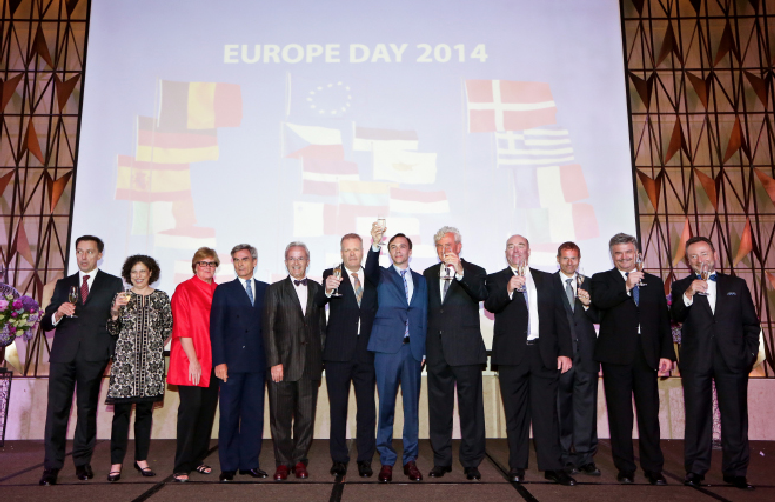
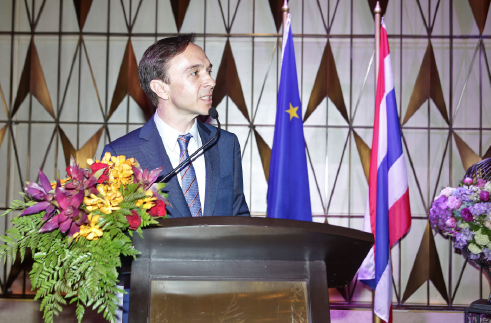
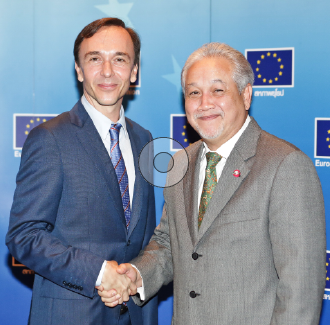
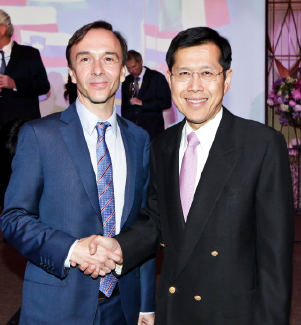
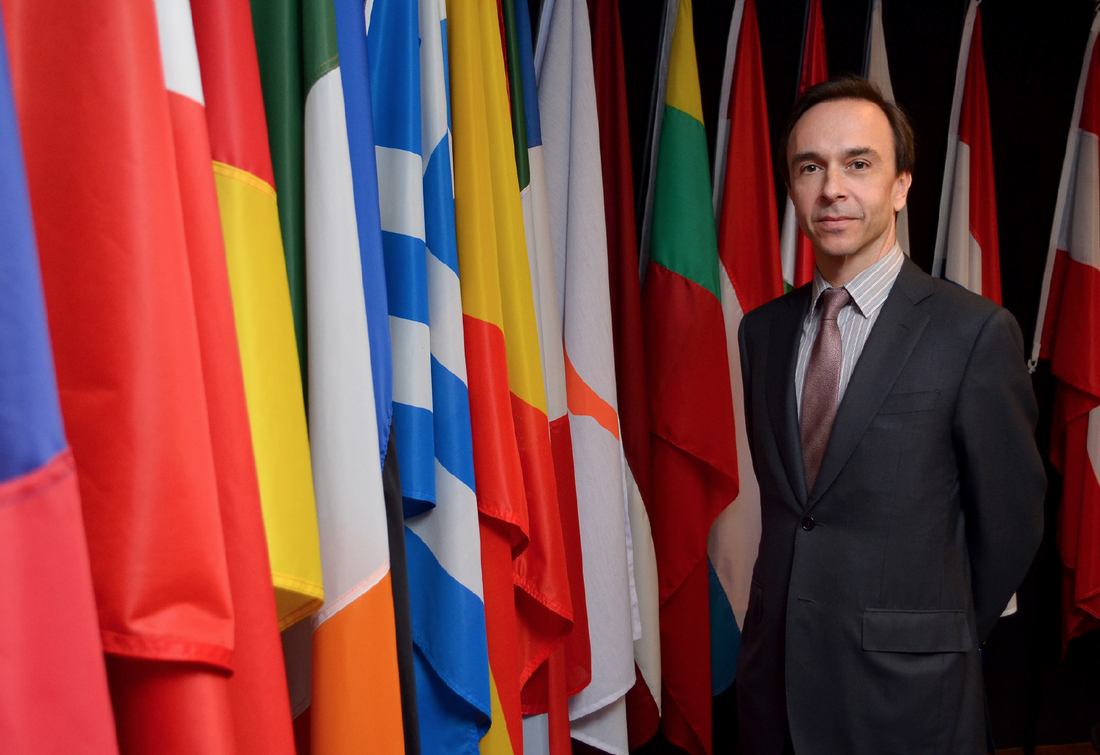
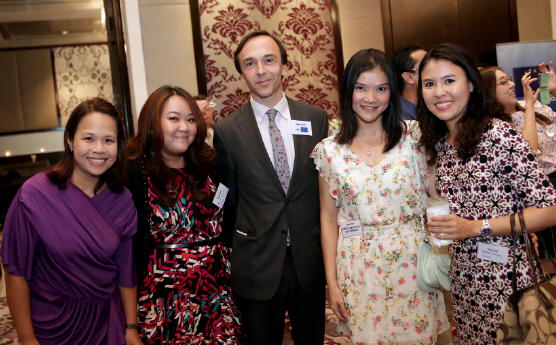
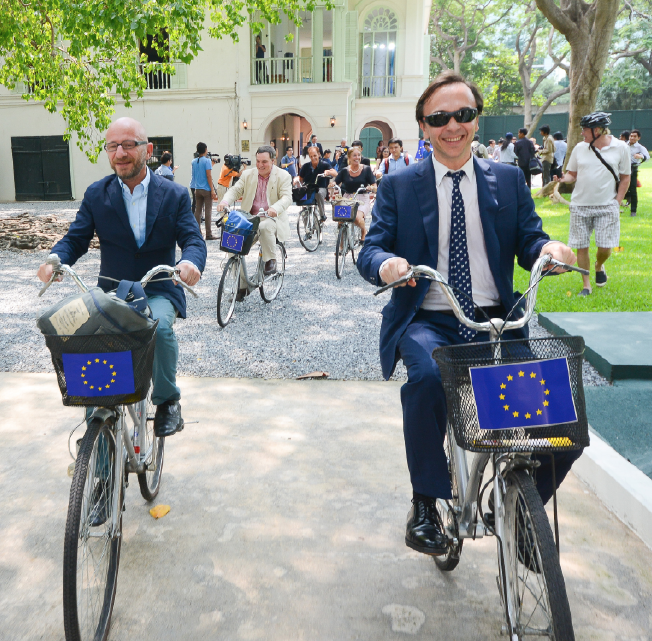
 RSS Feed
RSS Feed
















